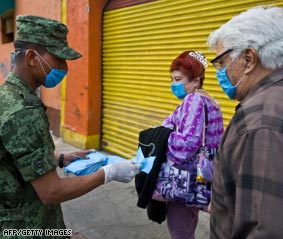(CNN) -- [b]The United States government declared a public health emergency Sunday as the number of identified cases of swine flu in the nation rose to 20.
1 of 3 The declaration is part of a "standard operating procedure" that will make available additional government resources to combat the virus, Homeland Security Secretary Janet Napolitano said at the White House.
Additional cases of swine flu are expected to be reported in the coming days, added Dr. Richard Besser, acting director of the Centers for Disease Control and Prevention.
No one has died in the U.S. from swine flu, officials said Sunday.
In New York City, Mayor Michael Bloomberg said eight students at St. Francis Prepatory School in Queens have tested positive for swine flu. More than 100 students at the school were absent with flu-like symptoms last week, he said.
State public health officials in Ohio confirmed one case of swine flu on Sunday. There have been seven confirmed cases in California, two in Kansas, and two in Texas, Besser said.
The World Health Organization advised all countries to be on the lookout for "unusual" outbreaks of flu, after an emergency meeting Saturday as the seriousness of the outbreak became clear.
By Sunday, 81 deaths in Mexico had been deemed "likely linked" to swine flu. Viral testing has confirmed 20 cases, said Dr. Jose A. Cordova Villalobos, Mexico's health secretary.
In Mexico City, the massive downtown Cathedral of Mexico City was open but Masses were not scheduled. Dozens of worshippers put on masks and went inside the church anyway to pray on their own.
Canada confirmed its first cases of swine flu on Sunday, with four people said to have the virus in the eastern province of Nova Scotia, health officials said.
Dr. Robert Strang, Nova Scotia's chief public health officer, said the cases were among students who had recently traveled to Mexico.
Strang said the people affected were only "mildly ill," and all are recovering. He said people who had recently been traveling should call their doctor and stay home if they suffer flu-like symptoms.
The H1N1 strain of swine flu is usually associated with pigs. When the flu spreads person-to-person, instead of from animals to humans, it can continue to mutate, making it a tougher strain that is harder to treat or fight off.
Symptoms of swine flu include fever, lethargy, lack of appetite, coughing, runny nose, sore throat, nausea, vomiting and diarrhea, according to the CDC.
[/b]
http://edition.cnn.com/2009/HEALTH/04/2 ... index.html





